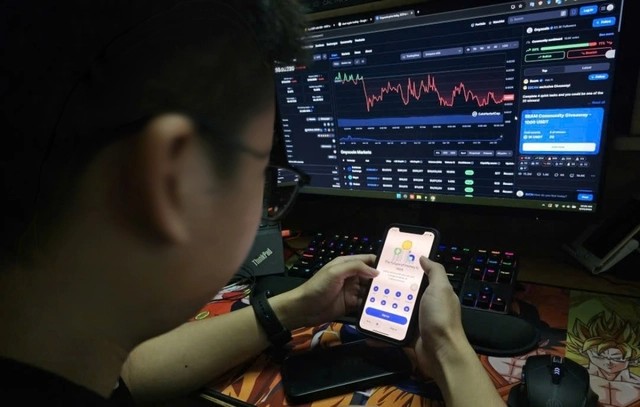 Economy
Economy


|
| A crypto trader watches market movements. — Photo nld.com.vn |
HÀ NỘI — As the growth of digital assets opens up opportunities for innovation and economic participation, experts have raised concerns about regulatory gaps and the vulnerability of Vietnamese users to legal, financial and operational risks, according to industry experts and insiders.
While Việt Nam ranks among the top countries globally in cryptocurrency adoption, most users engage at a basic level, often driven by short-term profit motives rather than long-term strategies or technical understanding. According to Trương Gia Bảo, Chairman of the Sustainable Blockchain Club, a significant portion of Vietnamese traders exhibit 'FOMO' behaviour—fear of missing out—without sufficient knowledge or planning.
“The market here is wide, but not deep,” Bảo noted. “We see millions participating in entry-level transactions, but few are involved in developing blockchain solutions or making institutional-grade investments.”
.jpg)
|
| Speakers at a conference on digital assets last year in Việt Nam. VNA/VNS Photo |
The American firm Chainalysis reported that Việt Nam ranked fifth globally in its 2024 Global Crypto Adoption Index, with inflows of around US$120 billion between July 2022 and June 2023. During the same period, Vietnamese investors gained approximately US$1.18 billion in crypto profits. However, experts caution that these figures reflect activity volume, not necessarily market maturity, or in any way reflect investor protection.
Despite the rising number of Vietnamese cryptocurrency holders—estimated at between ten to seventeen million—there is currently no comprehensive legal framework governing cryptocurrency exchange activities in the country. Digital assets such as Bitcoin and Ethereum are not recognised as legal tender, nor is there official guidance for opening or managing crypto accounts on global platforms.
Vulnerability
According to Nguyễn Đình Thắng, Chairman of the VINA Fintech Club and Head of the Digital Asset Management Centre, the lack of legal clarity exposes investors to a range of risks, particularly in peer-to-peer (P2P) trading, where users convert Vietnamese đồng into stablecoins like USDT or USDC to access international exchanges.
“These transactions are largely unregulated, leaving participants vulnerable to fraud, money laundering and asset loss,” Thắng said. “The system lacks safeguards. When things go wrong, there’s no formal mechanism for recovery or protection.”
Alongside legal risks, the collapse of several high-profile crypto exchanges has highlighted the fragility of the global digital asset ecosystem. The downfall of Terra-Luna in South Korea and the FTX crash—where a platform once valued at over US$30 billion folded within days—demonstrates the impact of inadequate regulation and corporate governance.
“In such cases, individual investors are often the first to suffer losses, with little recourse,” said Thắng. “Without legal support or insurance frameworks, Vietnamese users remain especially exposed.”
Potential
Despite the challenges, some experts believe Việt Nam could benefit from participating more actively in the digital asset space, particularly through the development of a central bank digital currency (CBDC). A state-issued digital đồng, backed 1:1 by the physical currency, could offer price stability, improve transaction efficiency and serve as a regulated alternative to private cryptocurrencies.
“CBDCs offer a way to embrace the benefits of digital finance while ensuring state oversight and security,” Bảo said.
This approach is in line with efforts by central banks in countries such as China, the EU and Singapore, which are exploring or piloting digital currencies.
Legal options
Experts have also urged policymakers to adopt a more flexible, common law-style approach to regulation.
Unlike civil law systems, which require precise legal definitions before implementation, common law frameworks allow for legal interpretation to evolve alongside market developments. Countries such as the US, UK, Singapore and Switzerland have leveraged this approach to better adapt to the fast-paced nature of digital finance.
“Civil law tends to lag behind the market,” Bảo explained. “If Việt Nam wants to lead in financial technology, we need regulatory systems that evolve with reality, not after it.”
In response to these concerns, the Vietnamese Government has tasked the Ministry of Finance with developing a legal framework for managing digital assets and related services, expected to be completed by May 2025. The draft Law on Digital Technology Industries, introduced to the National Assembly in late 2024, also includes preliminary provisions for digital assets.
Until these regulations are in place, experts advise Vietnamese users to exercise caution and thorough due diligence, before participating in cryptocurrency trading, especially on unregulated international platforms. — VNS




